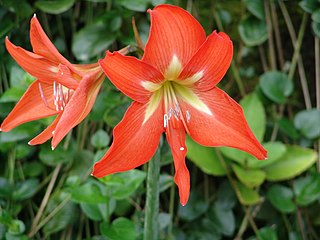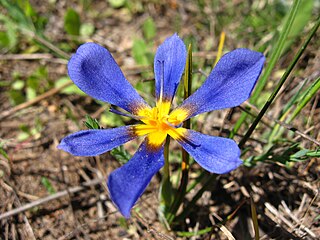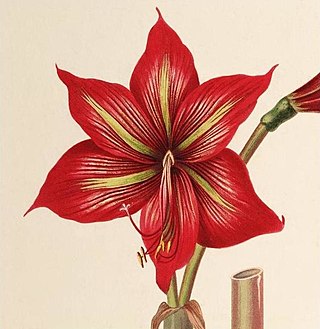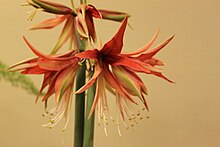
Hippeastrum is a genus of about 90 species, and over 600 hybrids and cultivars, of perennial, herbaceous and bulbous plants, native to tropical and subtropical regions of the Americas, from Mexico south to Argentina and on some islands in the Caribbean. The majority have large, fleshy bulbs—usually about the size of a softball—and tall, broad, strap-like leaves that are (generally) evergreen, and large red or purple flowers. Numerous colors and cultivars have been created over the past hundred years.

Octomeria is a plant genus belonging to the family Orchidaceae. The genus comprises about 150 species native to the Neotropics, mostly in Brazil.

Arachnothryx is a genus of flowering plants in the family Rubiaceae. It contains about 107 species. It is found from Mexico to Peru and in Trinidad.

Rhaphidophora is a genus in the family Araceae, occurring from tropical Africa eastwards through Malesia and Australasia to the Western Pacific. The genus consists of approximately 100 species.
Habranthus (copperlily) was a formerly recognized genus of tender herbaceous flowering bulbs in the subfamily Amaryllidoideae of the family Amaryllidaceae. It is now included within a more broadly circumscribed genus Zephyranthes. The genus was first identified by pioneering bulb enthusiast William Herbert in 1824.

Calydorea is a small genus of perennial, herbaceous and bulbous plants in the family Iridaceae native to Mexico and South America. The plants in the genus are small with tunicated bulbs. The flowers are light blue, violet, white, or yellow, depending on the species, of which there are around twenty. Taxonomists considered that the already known genera Salpingostylis, Cardiostigma, Catila and Itysa are not enough different from each other to justify their taxonomic segregation and, for this reason, all of them are now included in Calydorea.

Rogiera is a genus of flowering plants in the family Rubiaceae. It has 15 species and its native range is from Mexico to Colombia.

Hippeastrum aulicum, the Lily of the Palace, is a bulbous perennial, in the family Amaryllidaceae, native to the Atlantic Forest and Cerrado ecoregions from Brazil to Paraguay, in South America.

Hippeastrum correiense is a flowering perennial herbaceous bulbous plant, in the family Amaryllidaceae, native to Brazil.

Hippeastrum miniatum is a flowering perennial herbaceous bulbous plant, in the family Amaryllidaceae, native to Peru.

Hippeastrum papilio is a flowering perennial herbaceous bulbous plant, in the family Amaryllidaceae, native to southern Brasil.

Phycella is a genus of herbaceous, perennial bulbous flowering plants belonging to the family Amaryllidaceae, subfamily Amaryllidoideae. The genus consists of five species distributed from central Chile to northwestern Argentina.

Hippeastrum pardinum is a flowering perennial herbaceous bulbous plant, in the family Amaryllidaceae, from Peru to Bolivia. Originally collected in 1866 by Richard Pearce, it was used in breeding programmes.

Hippeastrum psittacinum is a flowering perennial herbaceous bulbous plant, in the family Amaryllidaceae, native to Brazil.

Gunnera magellanica is a perennial rhizomatous dioeceous herb native to Chile, Argentina and the Falkland Islands, and Andean areas of Peru, Ecuador. In the southern part of its range it grows in damper parts of the Magellanic subpolar forests and Valdivian temperate forests, and shrub formations on Tierra del Fuego, with an altitudinal range from sea level to 1500m.

Hippeastrum striatum, the striped Barbados lily, a flowering perennial herbaceous bulbous plant, in the family Amaryllidaceae, native to the southern and eastern regions of Brazil.

Hippeastrum reticulatum, the netted-veined amaryllis, is a flowering perennial herbaceous bulbous plant, in the family Amaryllidaceae, native to South America.

Bessera elegans, also known by the common name coral drops, is a cormous herbaceous perennial flowering plant in the family Asparagaceae, from Mexico.

Pseudobombax longiflorum is a species of flowering plants of the family Malvaceae. It is found in Bolivia and Brazil.




















